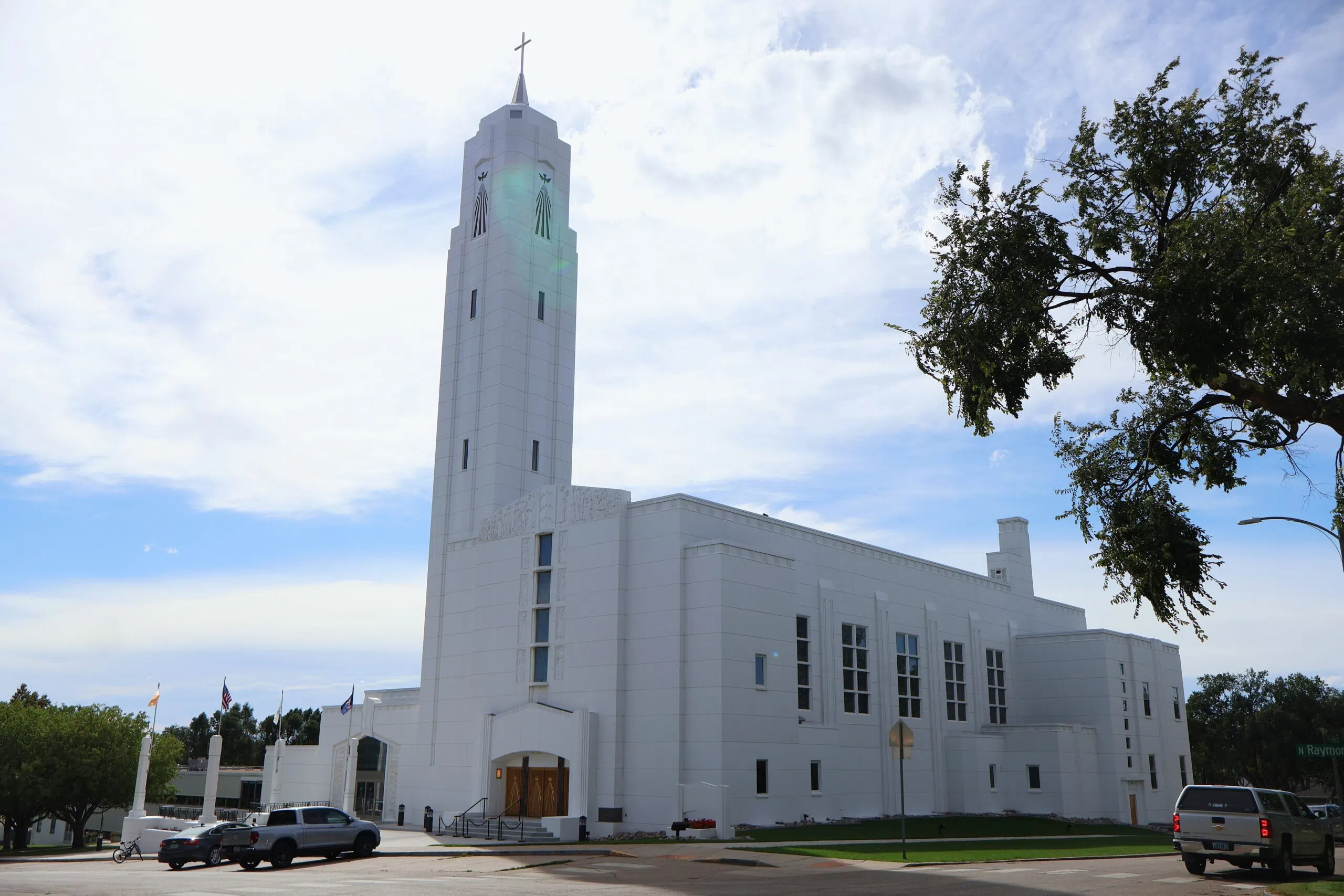
The Cathedral of the Holy Spirit, part of the Catholic Diocese of Bismarck, sits on Raymond Street on Sept. 18, 2024. (Michael Achterling/North Dakota Monitor)
By: Mary Steurer
BISMARCK, N.D. (North Dakota Monitor) – The Catholic Diocese of Bismarck and a Catholic employers’ association are suing the federal government over regulations that protect employees who seek abortion or fertility treatments and shield LGBTQ workers from discrimination.
In an August complaint filed in federal court, the diocese and association call the regulations abuses of power that violate the rights of employers opposed to abortion, fertilization treatments and LGBTQ accommodations on religious grounds.
The lawsuit concerns two documents published by the Equal Employment Opportunity Commission in April: a rule implementing the Pregnant Workers Fairness Act and updated guidance on workplace harassment.
Attorneys representing the Catholic Diocese of Bismarck and the Catholic Benefits Association have asked U.S. District Court Judge Daniel Traynor to temporarily suspend enforcement of the regulations as the lawsuit plays out.
The Pregnant Workers Fairness Act, signed into law by President Joe Biden in 2022, is meant to protect pregnant and postpartum mothers against workplace discrimination. It requires employers to provide pregnant workers accommodations including food, water and bathroom breaks, reduced physical labor and medical leave.
But when EEOC adopted its nearly 125-page rule executing the act, it also included protections for employees seeking abortions and fertility treatments.
The Bismarck diocese and Catholic Benefits Association argue that this goes against the original intent of the law, and therefore is a violation of federal statute.
The plaintiffs also claim the rule is an unconstitutional infringement upon their religious freedoms because abortion and in-vitro fertilization are against the Catholic Church’s teachings.
The rule will force the plaintiffs to either accommodate practices they consider immoral or face charges of workplace discrimination, Andrew Nussbaum, an attorney for the plaintiffs, said at a hearing last week in U.S. District Court in Bismarck.
“We’re living in fear that we’ll go through thousands of enforcement actions,” Nussbaum said during the hearing.
The EEOC in the rule says its inclusion of abortion protections is “consistent with the commission’s and courts’ longstanding interpretation of the same phrase in Title VII” of the Civil Rights Act of 1964, which outlaws workplace discrimination.
The agency makes similar arguments in defense of its decision to include fertility, writing that “several courts have found that it protects against discrimination for those undergoing in vitro fertilization (IVF) or infertility treatments related to becoming pregnant because these actions are related to the capacity to become pregnant.”
Attorneys for the EEOC said last week that the agency still allows employers to request religious exemptions from the rule, and that such requests will be evaluated on a case-by-case basis.
That means that the EEOC only weighs whether to grant an employer an exemption when that employer is already facing a discrimination complaint.
This is a departure from how the EEOC handles religious exemptions under Title VII, Nussbaum argued.
Title VII includes a provision allowing religious employers to refuse to hire someone of a different faith. It’s meant to shield employers from having to make employment decisions that conflict with their religious views.
The plaintiffs say they like how the Title VII exemption is worded, and don’t understand why the EEOC’s Pregnant Workers Fairness Act rule doesn’t incorporate similar language.
Laura Bakst, an attorney representing the EEOC, said the rule allows the federal agency to decide cases “with full context the nature of the employer and nature of the issue.”
The diocese and association also take issue with the EEOC’s April guidance on workplace harassment.
The guidance, while non-binding, interprets sex-based discrimination under Title VII to also include harassment based on reproductive decisions — like abortion, fertility treatment and contraception — as well as gender identity.
The Diocese of Bismarck and Catholic Benefits Association claim that this goes against the original intent of Title VII, and infringes on their religious freedoms.
They complain that both the Pregnant Workers Fairness Act rule and the guidance could leave religious employers vulnerable to workplace harassment claims for so much as expressing opposition to abortion or LGBTQ rights for religious reasons.
The diocese and Catholic Benefits Association ultimately want Traynor to rule that the EEOC cannot require them to observe workplace protections for abortion, IVF and for LGBTQ people that conflict with their faith.
They also want the judge to vacate the part of the Pregnant Workers Fairness Act that references abortion and IVF, and to require the EEOC add an exemption for religious employers to the rule similar to the language in Title VII.
Both the rule and Title VII apply only to employers with 15 or more workers.
The EEOC in legal filings has argued the Catholic Benefits Association doesn’t have standing to bring the lawsuit because it hasn’t sufficiently demonstrated that the rules would be enforced against its individual members.
The EEOC wrote that the diocese and association have not adequately established that the harms they allege come specifically from the Pregnant Workers Fairness Act rule or the guidance, as opposed to the protections established in Title VII itself. The agency said the plaintiffs have not proven the remedies they seek from the courts would protect them from discrimination claims, either.
It also claims that neither the rule or the guidance would endanger religious speech.
The judge said he would take the motion under advisement.
Traynor was appointed to the bench by former President Donald Trump in 2020. He served as a board member for the North Dakota Catholic Conference from 1999-2001, according to a questionnaire for judicial nominees.
During the hearing, he stated repeatedly that he suspects the rule enables the EEOC to judge the legitimacy of employers’ religious beliefs, and that businesses are at a significant disadvantage if they can only claim a religious exemption after a complaint is filed.
The EEOC can use the rule as a way to “bludgeon and dirty up” religious employers, and “hold them up to criticism in the public square” until they submit to the requirements, Traynor said.
Bakst said this was not the EEOC’s intent, and that this incorrectly assumes “that the EEOC wouldn’t take religious beliefs seriously” when processing discrimination complaints.
A federal court in June already halted enforcement of the EEOC rule in Louisiana and Mississippi.
North Dakota courts have recently ruled in favor of religious organizations in similar religious freedom cases.
Earlier this year, Traynor ruled that the EEOC cannot force the Christian Employers Alliance, another religious employers association, or its members to provide insurance coverage for gender-affirming care.
North Dakota U.S. District Court Judge Peter Welte in 2021 likewise ordered that a group of Catholic employers, including the Catholic Benefits Association, could not be required by the U.S. Department of Health and Human Services or the EEOC to pay for or help their workers obtain gender-affirming care. The U.S. Court of Appeals for the Eighth Circuit upheld Welte’s ruling, though it found that Welte’s order did not apply to the Catholic Benefits Association because the group had not established it has standing to sue on behalf of its unidentified members. The Catholic Benefits Association has since filed a new case in Welte’s court asking for the same protections.




Comments